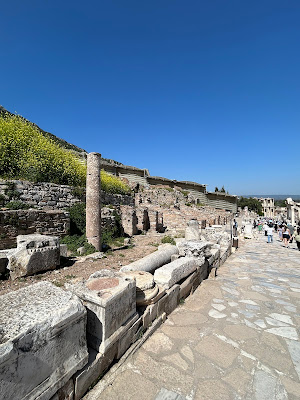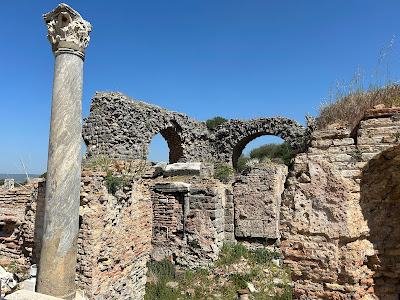In our visit to Ephesus, we started at the top of the city and worked our way down towards what would have been the old harbor.
Part of the original road. In theory, the Apostles Paul and John could have walked on this same pavement.
Entry to the Roman baths:
The Temple of the deified Hadrian:
The letters read "Latris", or latrines. Those Romans and their engineering.
The water channel where the sewage would have flowed out:
A local guide demonstrating its usage:
Cold and hard stone seats:
Proclamation by the Emperors Valentinian, Valens, and Gratian (ruled A.D. 364 - 378 jointly), granting the magistrate Eutroplus land to generate revenue for repair of the city. The original is above, the translation below.
The bottom of the hill. To our right is the road we were looking down yesterday, ahead of us is the road to the agora, harbor and theater, and to the left is the Library of Celsus.


















Those corners seats in that latrine....... cue badger nope! nope! GIF. Romans knew how to engineer, no power machines for them , just human/animal power.
ReplyDeleteNylon12, having now seen several Roman ruins, I become even more fascinated by them and their technology - considering what they had to work with, they did amazing things. Imagine what they could have done with our modern materials and power sources.
DeleteFunny, but I was thinking the exact same thing as Nylon12! There would be no tapping feet with former Senator Larry Craig. Your entire leg would be touching!
ReplyDeleteEd, it was either one of two things: A social conversational event or get in and get out.
DeleteThat said, I suspect this sort of crafted, regular latrine was considered top end stuff, considering the alternatives.
Ephesus is one of the places I would be particularly interested in. So much to see there! Can't help but wonder what it was like in its bustling glory.
ReplyDeleteLeigh, it must have been amazing. Learning what I did of the history, it is not surprise that it was the destination and dwelling place for several of the Apostles as an important regional center (capitol, in fact) as well as likely a more visited destination by ships.
DeleteWhat comes to mind is what did they use to wipe with? Hands, leaves,, towels, and then did the slaves take care of the towels?
ReplyDeleteAnon- It was actually natural sponges on a stick. There was a word for it (I just learned the word): xylospongium. It literally means "sponge on a stick" from the Greek. They were likely "used" and then "sanitized" in a bucket of vinegar or salt water. Assignment to handling them was assigned to a slave, and considered one of the worst jobs possible.
Deletehttps://en.wikipedia.org/wiki/Xylospongium